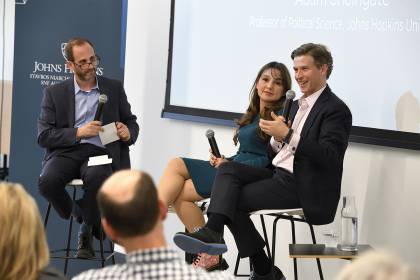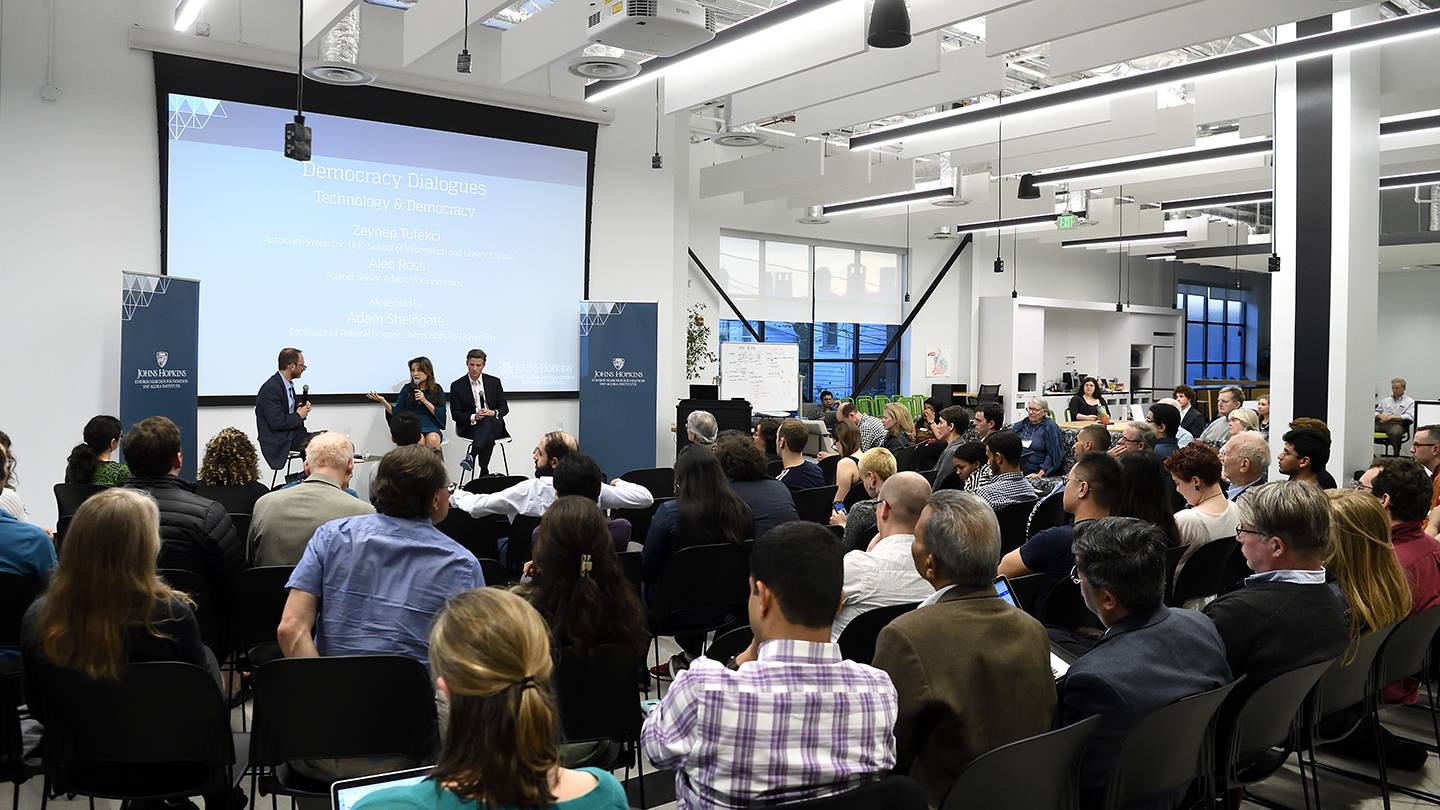For a sense of where technology may be taking us, many social commentators are looking to present-day China, where surveillance cameras line the streets, facial recognition scanners help catch criminals, and the government is assigning each individual a "social credit score" to rate their trustworthiness.
To Americans, that may sound like "Black Mirror on Steroids," as one Forbes article puts it, but technosociologist Zeynep Tufekci warns that it's not a just a distant dystopia.
"I think people should take China really seriously, because we're building the same infrastructure here," Tufekci said during a discussion Thursday evening at Johns Hopkins University. Although the West typically reserves such advanced tech tools for advertising, she said, "China is showing us how tech can be used in this kind of [surveillance] setting."
Fellow panelist Alec Ross, author of the 2016 bestseller The Industries of The Future, illustrated how these technologies in China function as tools of oppression.
"If they see you jaywalking, because of surveillance cameras and facial recognition, it can nudge down your social score," he said. In turn, that can make it more difficult for you to buy a train ticket, for example.

Image caption: The Democracy Dialogues event included (from left) moderator Adam Sheingate, Zeynep Tufekci, and Alec Ross
Image credit: Will Kirk / Johns Hopkins University
Both Ross, an innovator and investor who formerly served as the senior adviser for innovation at the State Department under President Barack Obama, and Tufekci, an associate professor at the University of North Carolina-Chapel Hill and regular columnist for The New York Times, are known for their pointed analysis on the intersection of technology and democracy. They came to Hopkins to explore this theme as part of a Democracy Dialogues event hosted by the university's Stavros Niarchos Foundation Agora Institute. The conversation was moderated by Adam Sheingate, professor and chair of JHU's Department of Political Science.
Much of the discussion focused on the tech giants of Silicon Valley and their relationship to global democracy. Ultimately, Ross suggested, "they've taken insufficient responsibility for the power of these platforms which are consequential in the exercise of geopolitical power.
"There's a difference between intelligence and wisdom," Ross added—and in his experience, many powerful tech leaders possess the former but not the latter.

Image caption: The talk took place in FastForward U, a new Johns Hopkins makerspace located in Baltimore's Remington neighborhood
Image credit: Will Kirk / Johns Hopkins University
"You get these young men—and they tend overwhelmingly to be young men—who rose through the engineering ranks, who came up with a good idea ... [but] they rarely stray outside of California, they haven't seen much of the world, they haven't experienced geopolitics."
Ross and Tufekci agreed that meaningful regulation and enforcement will be critical for holding tech giants accountable—particularly real financial consequences for bad actors. At end of the day, said Ross, what drives corporate behavior on these tech platforms is money, so the best way to change poor behavior is to hit their bottom lines
"When they make one of their mistakes, you have to fine them in a way that knocks a tooth or two out of their mouth," he said. "Make it very, very, very expensive when you screw up."
But, Tufekci noted, huge firms like Google can absorb a billion-dollar fine without flinching, and Ross expressed serious doubts about the ability of Congress to play a significant role in controlling tech. "Keep them out of it," he said.
The talk also examined activism in the age of social media. Tufekci's 2017 book Twitter and Tear Gas analyzed the ways social tools have helped amplify protest movements around the world, including Occupy Wall Street and the Arab Spring.
At Thursday's event, she recalled the exhilaration of protesters involved in the Egyptian revolution in 2011: "People just kind of held up their phones and said, 'We can do anything, this is amazing ... in 18 days the autocrat is gone."
But both Tufekci and Ross warned of structural flaws in this new breed of activism. With the Arab Spring, said Ross, "once the revolution was over, there was no individual or institutional power or track record behind it." The Muslim Brotherhood filled the void.
Tufekci contrasted this with historic protests like the March on Washington of 1963, which took years to develop.
"When you get to that moment in zero to 18 days, you're hitting your first curve unprepared," she said. "The old-style protest was kind of like an exclamation mark. The new one is like the question mark that starts the sentence in Spanish."
Posted in Voices+Opinion, Politics+Society
Tagged social media, technology, snf agora institute, democracy










